Can guinea pigs have watermelon? This question sparks curiosity among pet owners, as they seek to provide their furry companions with a healthy and enjoyable diet. Watermelon, with its refreshing sweetness and high water content, poses both nutritional benefits and potential risks for these small animals. Let’s delve into the world of watermelon and its implications for guinea pig health.
Watermelon offers an array of essential nutrients for guinea pigs, including vitamins A, C, and potassium. However, moderation is key, as excessive consumption can lead to digestive issues and other health concerns.
Nutritional Value of Watermelon for Guinea Pigs
Watermelon is a low-calorie fruit that is packed with essential nutrients for guinea pigs. It is a good source of vitamins A, C, and B6, as well as minerals like potassium, magnesium, and phosphorus. Watermelon also contains antioxidants that can help protect guinea pigs from cell damage.
Comparison to Other Fruits, Can guinea pigs have watermelon
Compared to other fruits suitable for guinea pigs, watermelon has a relatively high water content and a low sugar content. This makes it a good choice for guinea pigs who are overweight or have diabetes. Watermelon also contains more vitamin C than other fruits, which is important for guinea pigs because they cannot synthesize their own vitamin C.
Guidelines for Feeding Watermelon to Guinea Pigs: Can Guinea Pigs Have Watermelon
:max_bytes(150000):strip_icc()/guinea-pigs-diet-4580376-04-e9edfe71b55c4cad8bd8059b982cc564.jpg?w=700)
Watermelon can be a refreshing and nutritious treat for guinea pigs, but it’s essential to feed it in moderation. Here are some guidelines to ensure your furry friend enjoys this sweet treat safely:
Frequency and Quantity
Guinea pigs can have watermelon occasionally, as part of a balanced diet. Limit their intake to 1-2 small pieces (about the size of a grape) once or twice a week.
Gradual Introduction
Like any new food, introduce watermelon gradually into your guinea pig’s diet. Start with a tiny piece and monitor their reaction for any signs of digestive upset. If they tolerate it well, you can gradually increase the amount.
Health Risks of Overfeeding
Overfeeding watermelon can lead to health problems, including diarrhea, weight gain, and urinary tract infections. Always offer watermelon in moderation and monitor your guinea pig’s health after feeding it.
Preparation and Serving Methods

Preparing watermelon for guinea pigs is straightforward, but a few key steps ensure their safety and enjoyment.
Begin by thoroughly washing the watermelon to remove any surface contaminants. Cut the watermelon in half lengthwise, then use a spoon to scoop out the flesh, avoiding the rind. Remove any seeds, as they can be a choking hazard. Cut the flesh into small, bite-sized pieces to prevent choking.
Creative Serving Methods
To make watermelon more appealing to guinea pigs, consider these creative serving methods:
- Frozen Watermelon: Freeze small pieces of watermelon for a refreshing summer treat.
- Watermelon Skewers: Thread small pieces of watermelon onto a skewer, creating a fun and easy-to-eat treat.
- Watermelon Popsicles: Puree watermelon and freeze it in popsicle molds for a cool and hydrating snack.
- Watermelon Salad: Mix small pieces of watermelon with other guinea pig-friendly fruits and vegetables, such as strawberries, carrots, or bell peppers.
Health Considerations
Feeding watermelon to guinea pigs in moderation can provide hydration and prevent urinary tract infections. However, excessive consumption may lead to health issues.
Watermelon contains a high amount of water, which can be beneficial for guinea pigs, especially during hot weather. The high water content helps keep them hydrated and prevents dehydration.
In addition, watermelon is a good source of vitamin C, which is essential for guinea pigs’ immune system. Vitamin C helps protect guinea pigs from infections and diseases.
Digestive Problems
While watermelon can be a healthy treat for guinea pigs, it is important to feed it in moderation. Excessive consumption of watermelon can lead to digestive problems, such as diarrhea or bloating.
Guinea pigs have a sensitive digestive system, and too much watermelon can upset their stomachs. Diarrhea can lead to dehydration and other health problems, so it is important to avoid overfeeding watermelon.
Urinary Tract Infections
Watermelon can also help prevent urinary tract infections (UTIs) in guinea pigs. The high water content in watermelon helps flush out the urinary tract and prevent bacteria from building up.
UTIs can be a serious problem for guinea pigs, so it is important to take steps to prevent them. Feeding watermelon in moderation can help keep your guinea pig’s urinary tract healthy.
Alternative Treats for Guinea Pigs
While watermelon offers numerous nutritional benefits, it’s essential to provide guinea pigs with a diverse range of treats to ensure a balanced diet. Here are some alternative treats that provide similar nutritional value and cater to their unique dietary needs:
These treats offer a variety of vitamins, minerals, and antioxidants, complementing the nutrients found in watermelon. By rotating these treats, guinea pigs can enjoy a healthy and flavorful diet.
Fruits
- Berries (blueberries, raspberries, strawberries): Rich in antioxidants and vitamin C, supporting immune function and overall health.
- Apple (without seeds): Contains fiber, vitamin C, and potassium, aiding digestion and providing essential nutrients.
- Banana (in moderation): A good source of potassium, fiber, and natural sugars, providing energy and supporting digestive health.
Vegetables
- Carrot: Rich in beta-carotene (converted to vitamin A), supporting eye and skin health.
- Cucumber: High in water content, providing hydration and aiding digestion.
- Broccoli (in moderation): Contains vitamin C, antioxidants, and fiber, promoting immune function and overall well-being.
Herbs
- Parsley: A good source of vitamin C, antioxidants, and iron, supporting immune function and overall health.
- Basil: Contains antioxidants and anti-inflammatory compounds, aiding digestion and providing overall health benefits.
- Cilantro: Rich in vitamin K, vitamin C, and antioxidants, supporting blood clotting and overall well-being.
| Nutrient | Watermelon | Berries | Apple | Banana | Carrot | Cucumber | Broccoli | Parsley | Basil | Cilantro |
|---|---|---|---|---|---|---|---|---|---|---|
| Vitamin C | 12.1 mg | 10-25 mg | 14.3 mg | 10.3 mg | 5.9 mg | 2.8 mg | 93.4 mg | 125 mg | 16 mg | 28 mg |
| Potassium | 110 mg | 100-150 mg | 107 mg | 422 mg | 214 mg | 147 mg | 316 mg | 554 mg | 295 mg | 156 mg |
| Fiber | 0.4 g | 1-3 g | 2.4 g | 2.6 g | 2.8 g | 0.1 g | 2.6 g | 3.6 g | 2.6 g | 2.3 g |
| Vitamin A (beta-carotene) | 0.6 mg | 0.1-0.2 mg | 0.06 mg | 0.1 mg | 10.8 mg | 0.04 mg | 1.3 mg | 1.3 mg | 0.8 mg | 0.6 mg |
Last Recap

In conclusion, watermelon can be a nutritious treat for guinea pigs when fed in moderation. However, it’s crucial to introduce it gradually, monitor for any adverse reactions, and balance it with other healthy foods to ensure a well-rounded diet for your beloved pet.
Common Queries
How often can I feed watermelon to my guinea pig?
Guinea pigs can have watermelon once or twice a week as a treat, in small quantities of about 1-2 tablespoons.
Can baby guinea pigs eat watermelon?
No, baby guinea pigs under 6 months old should not be given watermelon due to their sensitive digestive systems.
What are the signs of watermelon overconsumption in guinea pigs?
Signs of overconsumption include diarrhea, bloating, and decreased appetite. If you observe these symptoms, discontinue watermelon feeding and consult a veterinarian.

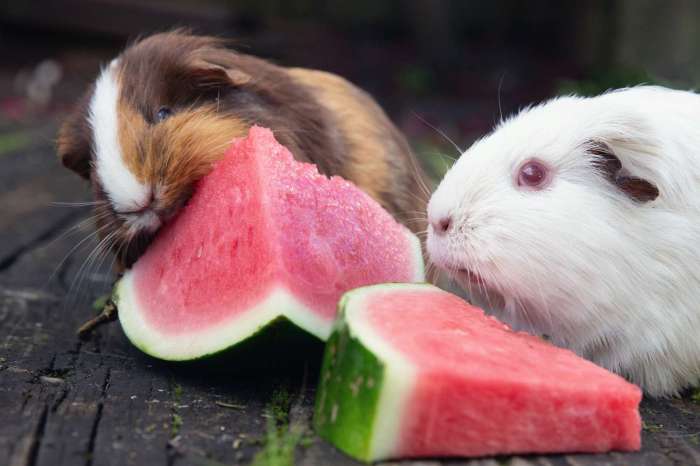
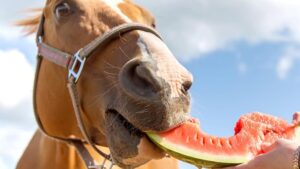

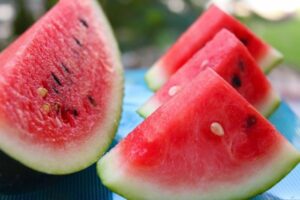
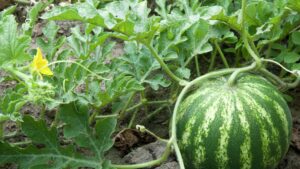
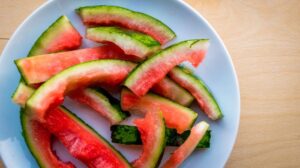
Leave a Comment